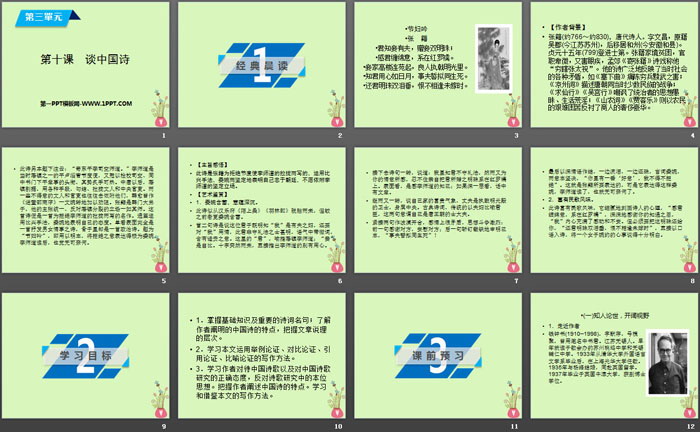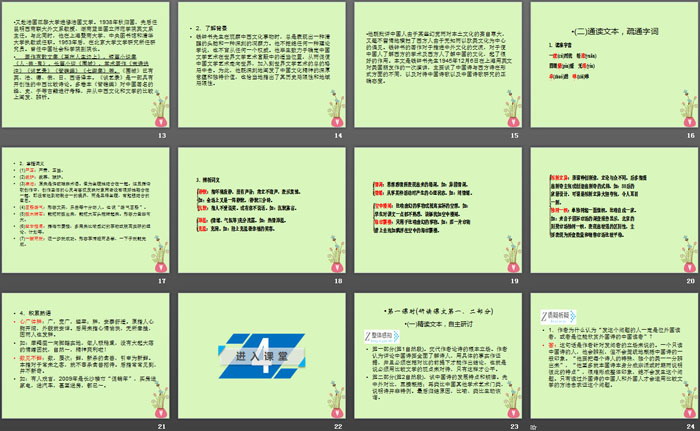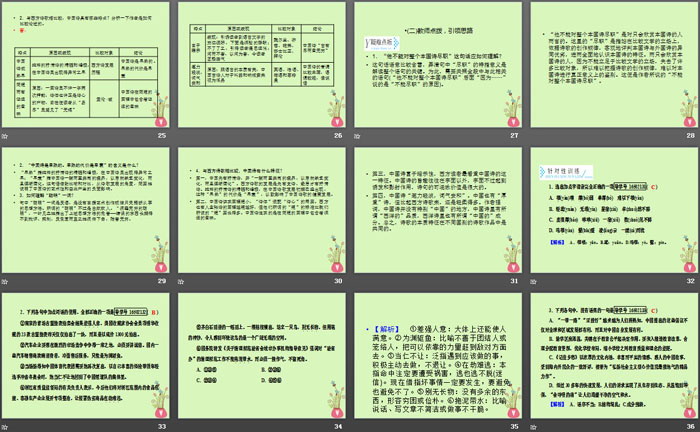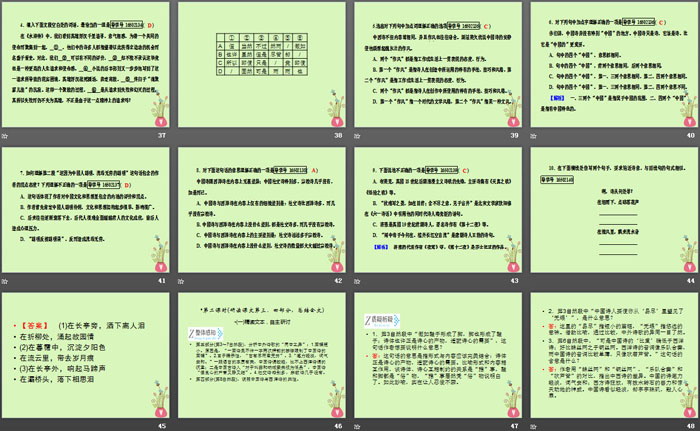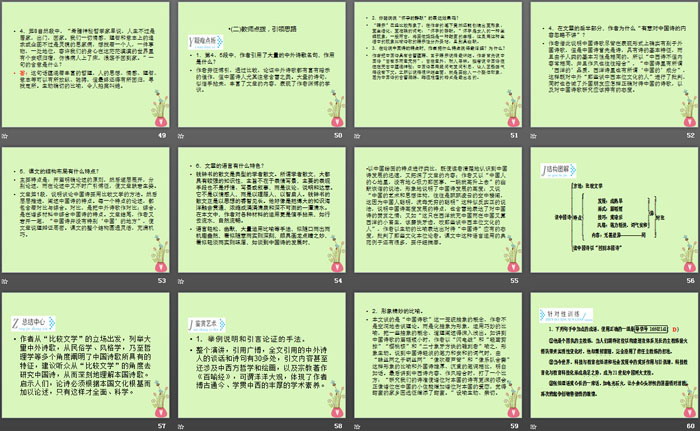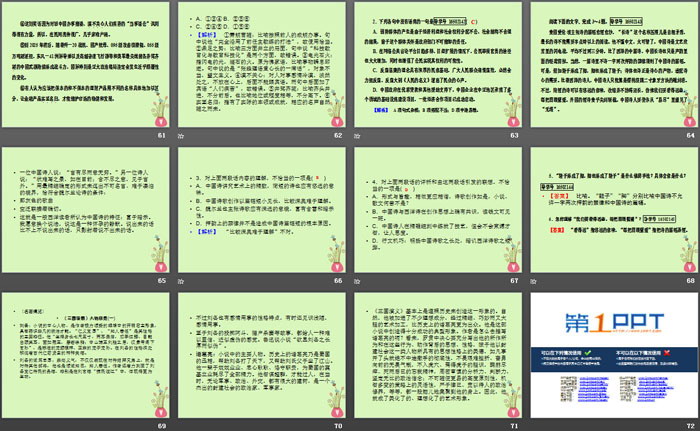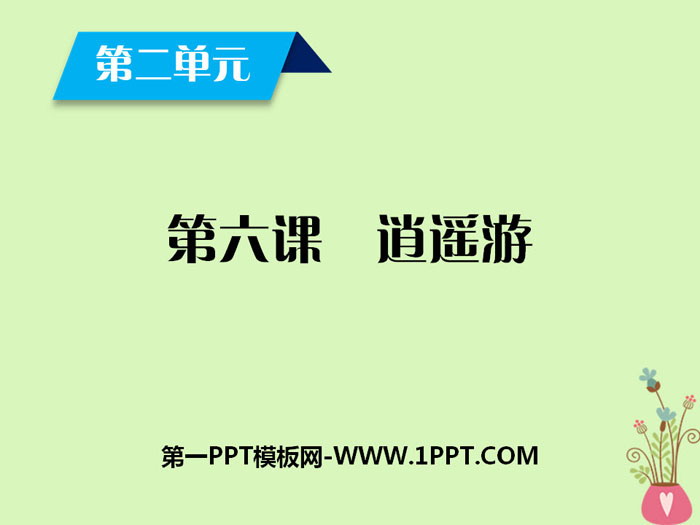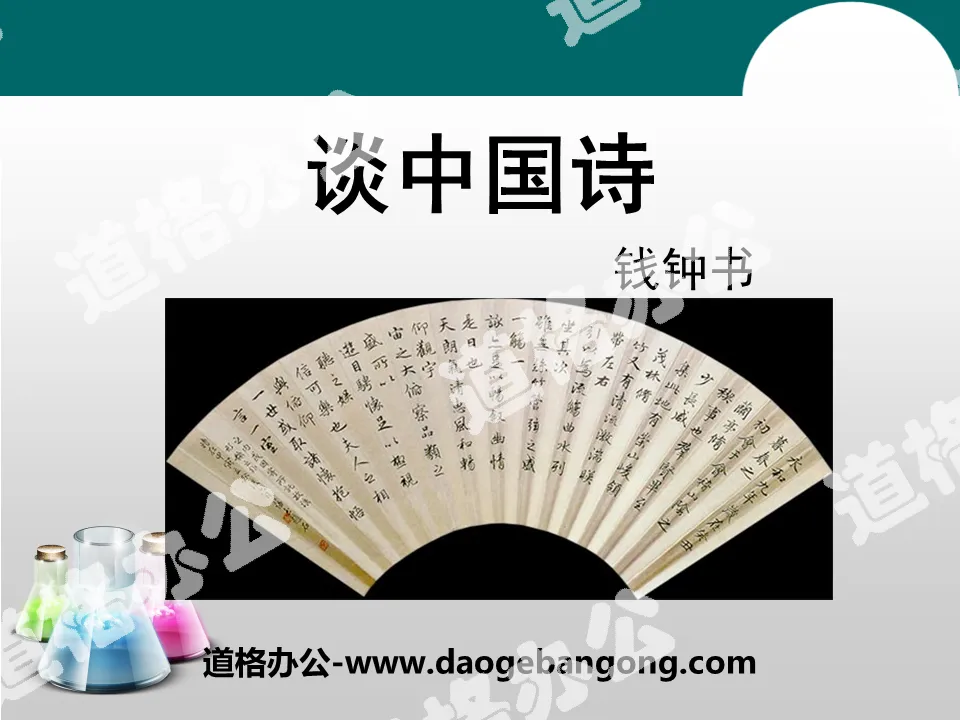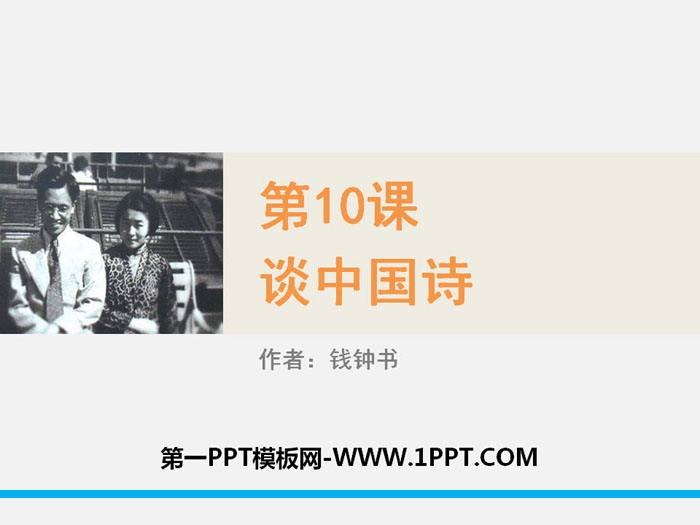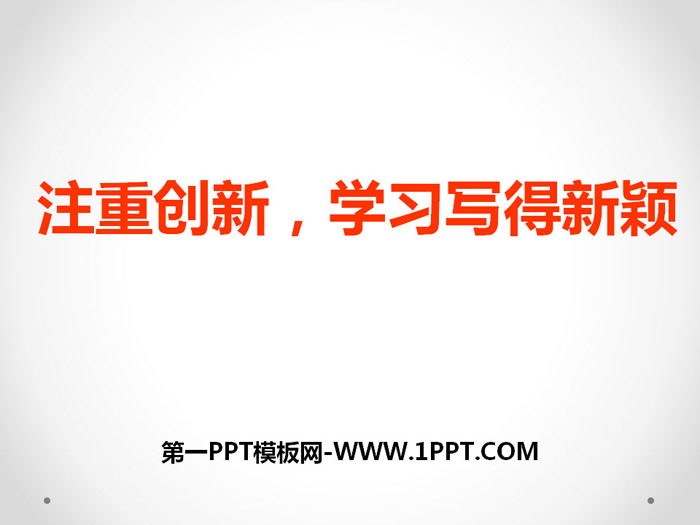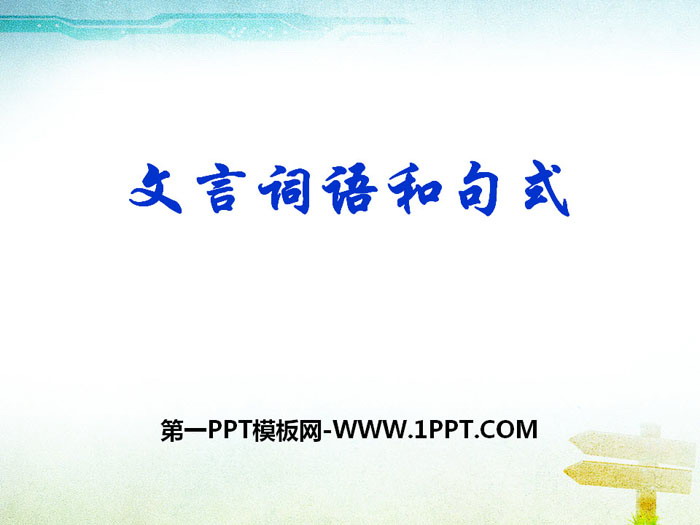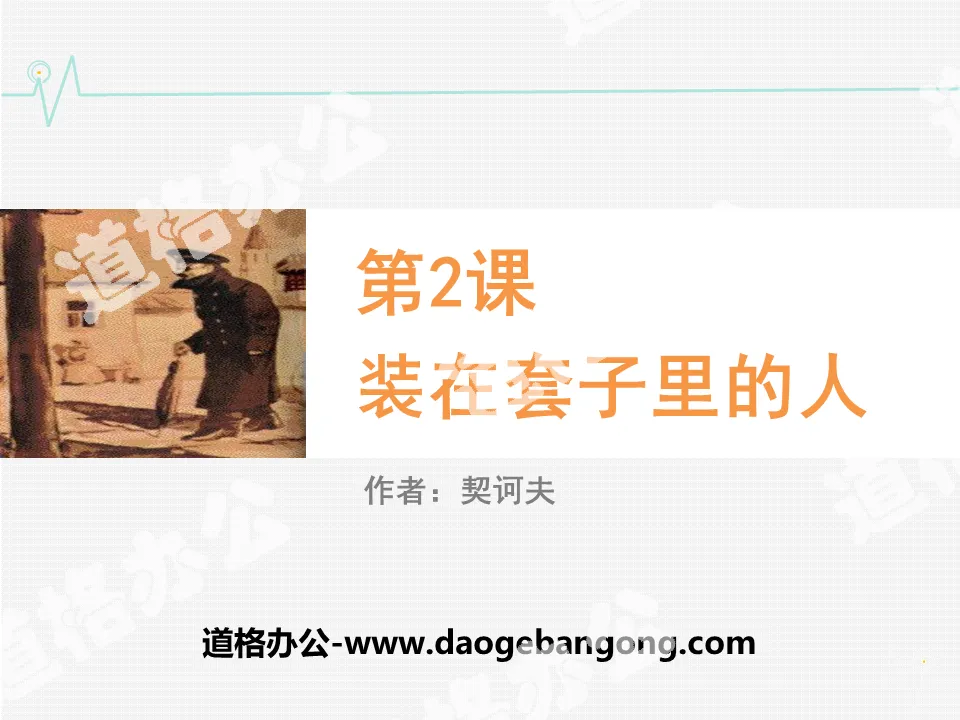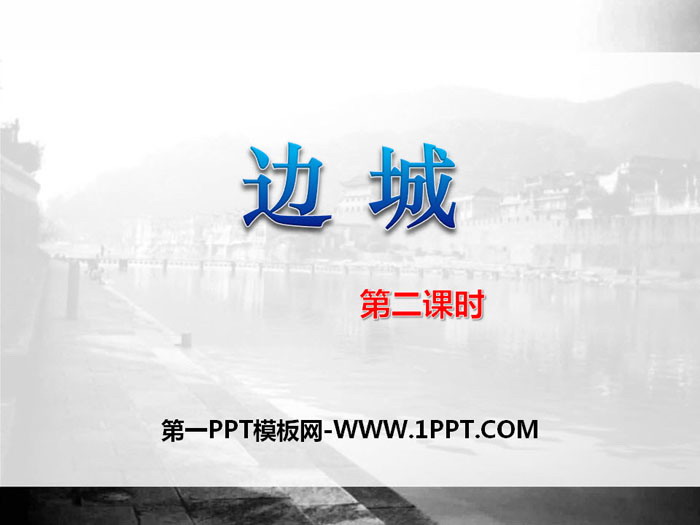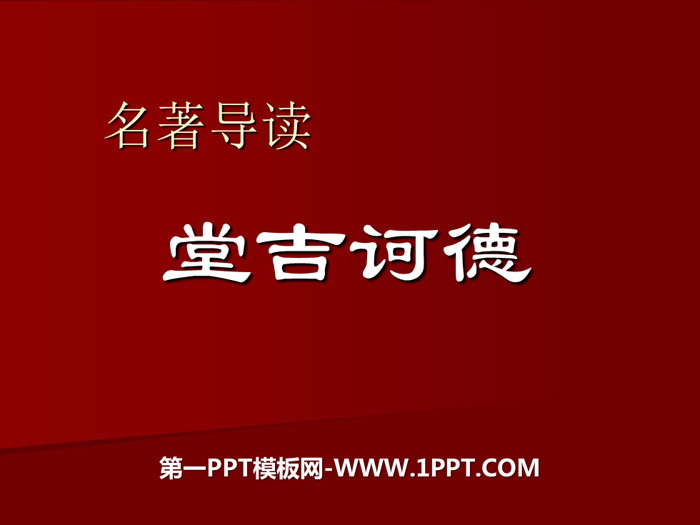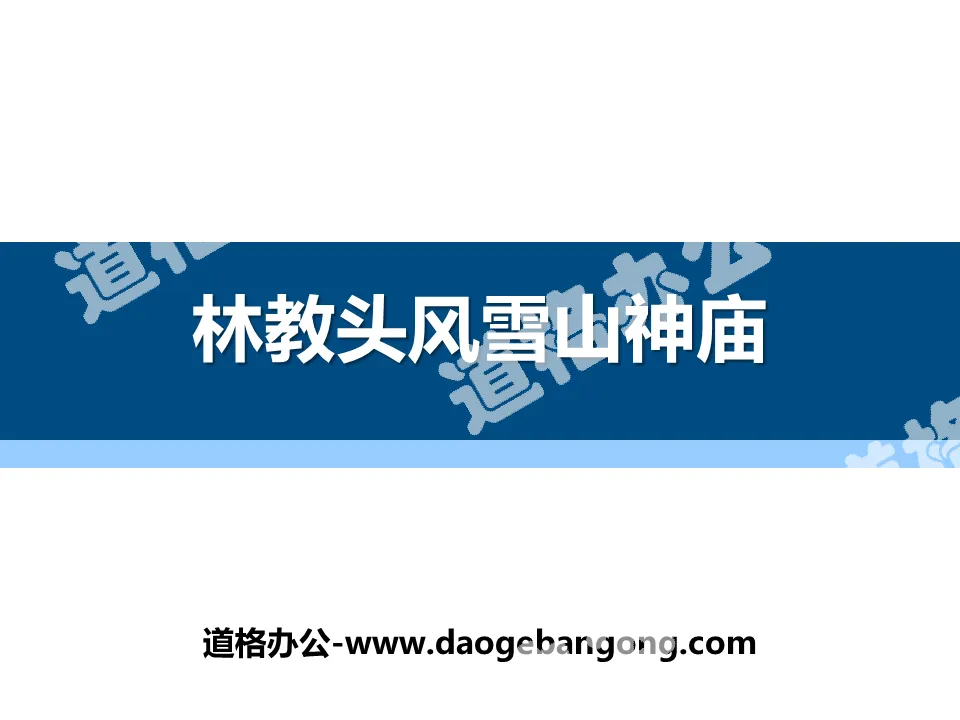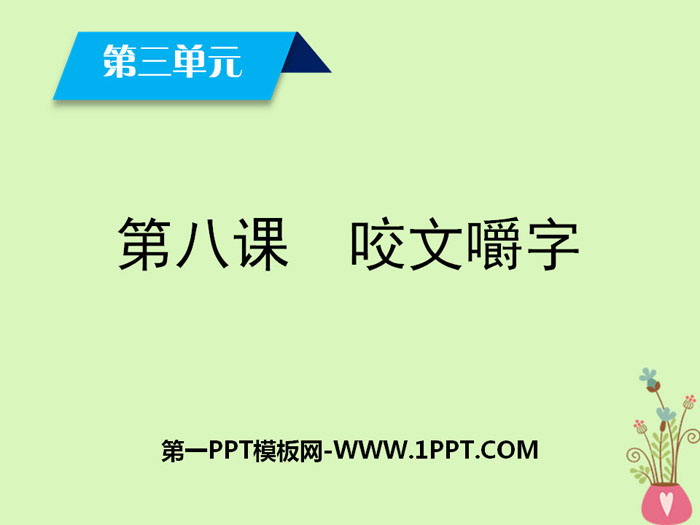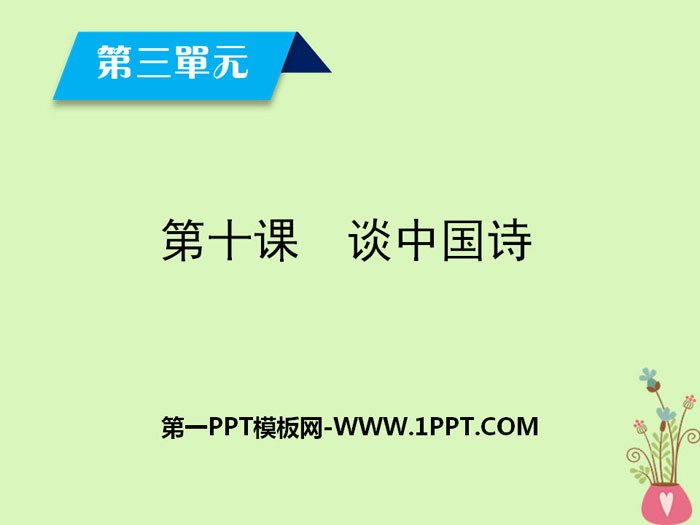
| Category | Format | Size |
|---|---|---|
| People's Education Press High School Chinese Compulsory Course Five | pptx | 6 MB |
Description
"Talking about Chinese Poetry" PPT download
Part One: Classic morning reading
Ching of a chaste woman
Zhang Ji
You know that I have a husband, so you give me a pair of pearls;
Feeling your lingering feelings, tied in red Luo Ru.
The concubine's house has high-rise buildings and gardens, and the beloved man is holding a halberd in the bright light.
I know that my heart is like the sun and the moon, and my husband's oath is like life and death.
Huanjun Mingzhu sheds tears, wishing she could not meet again when she was not married.
【Author background】
Zhang Ji (about 766 ~ about 830), a poet in the Tang Dynasty. With the courtesy name Wenchang, he was originally from Wujun (now Suzhou, Jiangsu), and later moved to Hezhou (now Hexian, Anhui). In the fifteenth year of Zhenyuan (799), he became a Jinshi. Zhang Ji's family was poor, his official position was humble, and he suffered from eye disease. Meng Jiao's poem "Send to Zhang Ji" jokingly called him "poor and blind Zhang Taizhu". His poems widely reflected various contradictions in the society at that time, such as "Song under the Sai" bitterly recounted the harm caused by military aggression; "Liangzhou Ci" described the war between the Tang Dynasty and the ethnic minorities at that time; "Pursuit of Immortality" and "Wu Gong Xing" mocked the rule The poets' ideological ignorance and debauched life; "Shan Nong Ci" and "Jia Ke Le" contrast the hardships of farmers with the luxury and luxury of businessmen.
There is a note in the title of this poem: "To Master Li Sikong in Dongping." Li Shidao was the military envoy of Pinglu and Ziqing, one of the vassal towns at that time, and he was also given the titles of Sikong, the Inspector of Schools, and Ping Zhangshi, Tongzhongshu Menxia. The momentum is hot. After the mid-Tang Dynasty, vassal towns were divided and various means were used to collude with literati and central officials. Some dissatisfied scholars and officials also tended to rely on them. Han Yu once wrote a "Preface to Dong Shaonan" to tactfully dissuade them. Zhang Ji is the eldest disciple of the Han sect. His stance of advocating for unification and opposing the division of vassal towns is just like that of his teacher. This poem is a masterpiece written to resist Li Shidao's attempts to win over. Use Bixing techniques throughout the article to express your attitude tactfully. On the surface, it is a poem expressing love between men and women, but underneath it is a political poem. The poem was titled "The Song of a Cherce Woman", which was used to clarify one's ambitions and express the meaning of rejection in an extremely euphemistic way. After reading it, Li Shidao felt helpless.
[Perception of the theme]
This poem was written by Zhang Ji to refuse the solicitation of Li Shidao, the governor of Jiedu. He used the metaphorical technique to euphemistically but firmly show that he was loyal to the court and unwilling to rely on Li Shidao's firm position.
【Art Appreciation】
1. Euphemistic and subtle, with profound meaning.
This poem seems to be derived from the Han Yuefu "Mo Shang Sang" and "Yu Lin Lang", but it is more euphemistic and implicit than the previous one.
The first two lines of the poem say that this gentleman knows clearly that "I" am a married woman, but still has feelings for "me". This gentleman is not a person who abides by etiquette and law. He is very clear about it, and his tone is full of criticism and condemnation. The "jun" here refers to Li Shidao in the feudal town; the "concubine" refers to self. The cross came suddenly, directly pointing out Li Shidao's ulterior motives.
Talking about Chinese Poetry PPT, Part 2: Learning Objectives
1. Master basic knowledge and important famous poems; understand the characteristics of Chinese poetry explained by the author, and grasp the level of reasoning in the article.
2. Learn how to write this article using examples, contrasts, quotations, and metaphors.
3. Learn the author's correct attitude towards Chinese poetry and research on Chinese poetry, and oppose the egocentric thinking in poetry research. Grasp the author's explanation of the characteristics of Chinese poetry. Learn and learn from the writing method of this article.
Talking about Chinese poetry PPT, the third part: preview before class
(1) Understand people and the world, broaden your horizons
1. Get closer to the author
Qian Zhongshu (1910-1998), also known as Mocun and Huaiju, once used the pen name Zhongshujun. A native of Wuxi, Jiangsu. In his early years, he studied at Suzhou Taowu Middle School and Wuxi Fu Jen Middle School run by the church. After graduating from the Department of Foreign Languages and Literature of Tsinghua University in 1933, he taught at Guanghua University in Shanghai. In 1935, he married Yang Jiang and went to England to study together. He graduated from Oxford University in England in 1937 and received an associate doctorate.
He went to the University of Paris in France to further study French literature. Returning to China in the autumn of 1938, he successively served as professor of the Foreign Languages Department of Southwest Associated University in Kunming and director of the English Department of Lantian National Normal University in Hunan. At the same time, he taught or worked at Shanghai Jinan University, the Central Library and Tsinghua University. After 1953, he worked as a researcher at the Institute of Literature of Peking University. He once served as vice president of the Chinese Academy of Social Sciences.
His works include a collection of essays "Written on the Edge of Life", a collection of short stories "Man·Beast·Ghost", a novel "Fortress Besieged", and academic works "Selected Notes on Song Poems", "Talk about Art", "Guan Zui Bian" and "Seven Sui Collection" wait. "Fortress Besieged" has been translated into English, French, German, Russian, Japanese and Spanish. "Talking about Art" is a groundbreaking comparative poetry theory between China and the West. The multi-volume "Guan Zhui Bian" examines and interprets famous Chinese ancient books such as Jing, Shi, Zi, etc., and elaborates and analyzes the comparison of Chinese and Western culture and literature.
2. Understand the background
Mr. Qian Zhongshu always shows a clear mind and profound insight when observing Chinese and Western cultural things. He did not reject any theory or blindly follow any authority. He devoted his life to determining the appropriate position of Chinese literature and art in the palace of world literature and art, thereby promoting Chinese literature and art to go global and join the general pattern of world literature and art. To this end, he not only profoundly elucidated the profound connotation and unique value of Chinese cultural spirit, but also appropriately pointed out its historical and regional limitations.
He not only criticized the Chinese people's arrogance of local culture due to certain illusions, but also ruthlessly swept away the Westerners' prejudices based on European and American culture due to ignorance. Qian Zhongshu's works have played a very good role in promoting cultural exchanges between China and foreign countries, and in enabling Chinese people to understand Western academics and Westerners to understand Chinese culture. This article is a speech given by Mr. Qian Zhongshu in English to American friends in Shanghai on December 6, 1945. It mainly talks about the differences in form between Chinese poetry and Western poetry, as well as the correct attitude towards Chinese poetry and the study of Chinese poetry.
Talking about Chinese Poetry PPT, Part 4: Entering the Classroom
The first lesson (study the first and second parts of the text)
(1) Read the text intensively and conduct independent discussion
Part One (Natural Paragraph 1). Explain the author's fundamental stance on poetry. The author believes that when commenting on Chinese poetry, one must have a comprehensive understanding of the poet, use specific facts as evidence, and draw conclusions based on comparative comparisons. In other words, it must be treated from a comparative literary perspective. Only in this way is it fair.
The second part (the second natural paragraph) discusses the development characteristics and laws of Chinese poetry. First, we compare China and foreign countries and make a direct summary; then we make analogies to other academic and artistic categories in China to show that poetry is not a special case. Finally, the reasons are summarized, and the metaphors and analogies are vivid and humorous.
1. Why does the author think that "the person who asked this question must be a foreign reader, or a Chinese reader who can appreciate foreign poetry"?
Answer: This sentence is expressed by the author based on the questioner’s standpoint. A person who only reads Chinese poetry will identify, but will not generalize the general impression of Chinese poetry. "He wants to distinguish the special and unique beauty of each poet one by one." "At most, he divides his country's poetry into sects or periods and explains the characteristics of each other." It is difficult to form an overall impression, and this problem will never occur. . Only Chinese and foreigners who have read foreign poetry can use comparative literature methods to verify this issue.
2. Compared with Western poetry, what are the characteristics of Chinese poetry? Analyze how the author compares the arguments.
(2) Teachers give guidance and lead ideas
1. How should we understand the sentence "He cannot do his duty to the whole of his country's poetry"?
The semantics of this sentence is relatively implicit, and clarifying the specific meaning of "duty" in the sentence is the key to interpreting the entire sentence. For this reason, we need to pay attention to the relevant sentences in the entire paragraph ("He cannot do his duty to the entire country's poetry" followed by "because..." refers to the reason for "not being able to do his duty").
2. What is the meaning of "Chinese poetry is premature. The price of premature maturity is premature aging"?
"Precocious maturity" refers to the essence and peak of pure lyric poetry, which appears unusually early in Chinese poetry; "premature aging" refers to the fact that Chinese poetry reaches a sublime realm overnight, but then lacks change and gradually deteriorates. This sentence briefly explains the artistry of Chinese poetry and the resulting negative impact from the perspective of poetry development with the help of metaphors and comparisons.
3. How do you understand the word "smart"?
The word "smart" in the sentence is an irony, which refers to a thinking method that only relies on assumptions without grasping the rules of artistic creation. The so-called "smartness" is nothing but self-deception. "Infinitely Poisonous Wisdom" pointed out the harm of the above-mentioned thinking method - wrong things cannot be criticized or resisted for a long time, but are spread openly, causing endless harm.
The second lesson (read the third and fourth parts of the text and summarize the full text)
(1) Read the text intensively and conduct independent discussion
The third part (paragraphs 3 to 7) analyzes the "similarities and differences" between Chinese and foreign poetry: 1. Short length. The reason is that "the prohibition against rhyming with a word twice in a poem limits the length of Chinese poetry." 2. Full of suggestiveness, "the words are endless but the meaning is endless". 3. "The writing is light and the words are calm." First, it has to do with the nature of language. Chinese poetry is lighter and not as heavy as Western poetry. Second, ancient Chinese poets "have always regarded shouting and shouting as low quality." ", Chinese poetry is "like the voice of conscience, quiet and thin." 4. There are many social poems and almost no religious poems.
The fourth part (paragraph 8) explains the commonalities between Chinese poetry and Western poetry.
1. In the third natural paragraph, "If the shoes form the feet, the feet also form the shoes; the poetic style may be the product of the poetic heart and adapt to the needs of the poetic heart." What does the author mean by this sentence?
Answer: This sentence means that form and content should be perfectly combined: poetic style is the product of the poetic heart and adapts to the needs of the poetic heart. Metaphorical form and content interact with each other, and talking about the mutual restraint of poetic style and poetic heart is an "elegant" thing. Shoes and feet are both "vulgar" things, and "elegant" things are actually explained clearly by "vulgar" things. Such a wonderful metaphor makes people laugh.
2. In the third natural paragraph, "Chinese poets want you to see the 'infinite' from the 'easy end'", what does it mean?
Answer: "Easy" here refers to the short length, and "boundless" refers to the long distance. With the help of metaphors and comparisons, the similarities and differences between Chinese and foreign poetry are clear at a glance.
3. In the sixth natural paragraph, "But the 'proportion' of Chinese poetry is indeed lower than that of Western poetry; it is like a spider web to a steel wire mesh. The tone of Western poetry is like an orchestra ensemble, while the tone of Chinese poetry is relatively thin, just like blowing a reed." Take care." What does this sentence mean?
Answer: The author uses the comparison between "spider web" and "steel wire web", "band ensemble" and "blowing reed pipe" to point out the differences between Chinese and Western poetry. Chinese poetry is light and gentle, while Western poetry is wild and wild, with the power of uprooting trees and turning rocks and the earth-shattering divine power. Chinese poetry may seem light, but each word is delicate and touches people's hearts.
Talking about Chinese poetry PPT, the fifth part: [Masterpiece Expo]
Appreciation of Characters in "Romance of the Three Kingdoms" (1)
Liu Bei: The central character of the novel is the ideal image of an enlightened monarch that the author strongly praises, and he has extraordinary ruling talents. "Benevolence, righteousness and generosity" and "knowing people and being good at taking charge" are the main characteristics of his character. He was "seven feet and five inches tall, with ears hanging down from the shoulders, hands above the knees, eyes that could look at his ears, a face like a crown of jade, and lips as if they were painted with grease; he was the great-great-grandson of Emperor Jing of the Han Dynasty after Liu Sheng, King Jing of Zhongshan," and was a standard dragon-faced man. Looks like an authentic son of a dragon. Deep in Liu Bei's character are the virtues of ancient benevolent kings and wise men.
Liu Bei's honesty, loyalty and admiration for loyalty are not only reflected in his treatment of sworn brothers, but also in his treatment of other generals. He is also a sincere confidant and knows people well. The author also focuses on portraying Liu Bei's kindness and kindness to the people, especially in Liu Xuande's "taking the people across the river", which is more vividly reflected.
However, Liu Bei also has an emotional personality, and sometimes he is ignorant and emotional.
As for the stories about Liu Bei throwing adou and Orion killing his wife, they all give people an unbelievable and almost hypocritical feeling. Lu Xun said that the novel "wanted to show Liu Bei's greatness but seemed fake".
Zhuge Liang: The main character in the novel. In history, Zhuge Liang was the prime minister of the Shu Kingdom. He helped Liu Bei conquer the world, and also helped Liu and his son to gain power. He worked conscientiously, loyally, and abided by his duties all his life, and spent all his energy on laying the foundation for the Kingdom of Shu. He was resourceful and talented. At that time, he made great achievements in military, politics, and diplomacy. He was an outstanding politician and strategist in feudal society.
Keywords: Free download of PPT courseware for the five compulsory high school Chinese courses from the People's Education Press, PPT download on Chinese poetry, .PPT format;
For more information about the "On Chinese Poetry" PPT courseware, please click on the "On Chinese Poetry ppt" tab.
"Talk about Chinese Poetry" PPT courseware download:
Download the first part of the PPT courseware "On Chinese Poetry": New course reading aid "On Chinese Poetry" is an excerpt of an English speech he gave to an American friend in Shanghai on December 6, 1945, translated by Mr. Qian Zhongshu of. The audience of this article is American friends, so this article begins...
"Talk about Chinese Poetry" PPT teaching courseware:
"Talking about Chinese Poetry" PPT teaching courseware Part One: Learning Objectives 1. Summarize the characteristics of Chinese poetry, and be able to tell the similarities and differences between Chinese poetry and Western poetry. 2. Combined with specific sentences, analyze the vivid, profound and humorous characteristics of metaphors in the article. The design idea is this...
"Talk about Chinese Poetry" PPT courseware:
"Talking about Chinese Poetry" PPT courseware The first part of the content: About the author Qian Zhongshu is a modern literature researcher and writer with the courtesy name Mo Cun and the pseudonym Huai Ju. He once used the pen name Zhongshu Jun. His representative work is the novel "Fortress Besieged". Whether his novels or essays, they all have the characteristics of wit and timelessness...
File Info
Update Time: 2024-07-22
This template belongs to Chinese courseware People's Education Press High School Chinese Compulsory Course Five industry PPT template
"Talking about Chinese Poetry" PPT download Simple campus recruitment activity planning plan summary enterprise and institution recruitment publicity lecture PPT template is a general PPT template for business post competition provided by the manuscript PPT, simple campus recruitment activity planning plan summary enterprise and institution recruitment promotion Lecture PPT template, you can edit and modify the text and pictures in the source file by downloading the source file. If you want more exquisite business PPT templates, you can come to grid resource. Doug resource PPT, massive PPT template slide material download, we only make high-quality PPT templates!
Tips: If you open the template and feel that it is not suitable for all your needs, you can search for related content "Talking about Chinese Poetry" PPT download is enough.
How to use the Windows system template
Directly decompress the file and use it with office or wps
How to use the Mac system template
Directly decompress the file and use it Office or wps can be used
Related reading
For more detailed PPT-related tutorials and font tutorials, you can view: Click to see
How to create a high-quality technological sense PPT? 4 ways to share the bottom of the box
Notice
Do not download in WeChat, Zhihu, QQ, built-in browsers, please use mobile browsers to download! If you are a mobile phone user, please download it on your computer!
1. The manuscript PPT is only for study and reference, please delete it 24 hours after downloading.
2. If the resource involves your legitimate rights and interests, delete it immediately.
3. Contact information: service@daogebangong.com
"Talking about Chinese Poetry" PPT download, due to usage restrictions, it is only for personal study and reference use. For commercial use, please go to the relevant official website for authorization.
(Personal non-commercial use refers to the use of this font to complete the display of personal works, including but not limited to the design of personal papers, resumes, etc.)
Preview

